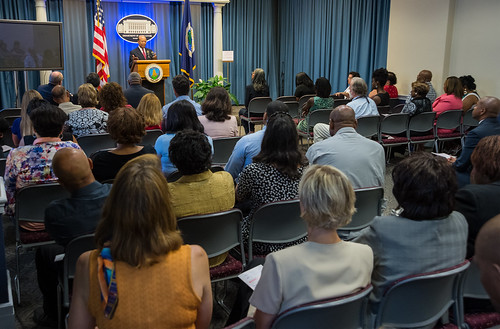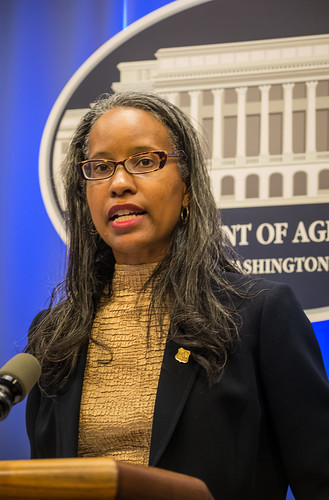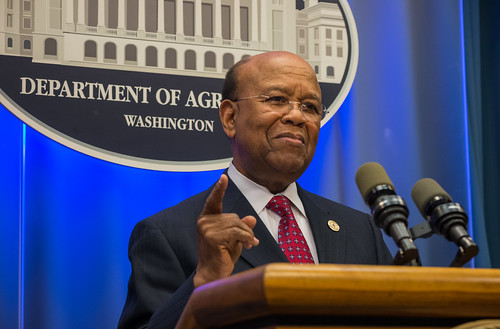
Where were you? Fifty years ago when President Lyndon Johnson signed the Civil Rights Act of 1964, where were you and what were you doing? That was the question asked last week as a capacity audience filled a conference room at the USDA Whitten Building to commemorate the passage of this landmark legislation. The observance, sponsored by USDA’s Office of Communications, attracted dignitaries including USDA Deputy Assistant Secretary Malcolm Shorter, Under Secretary for Marketing and Regulatory Programs Ed Avalos and Deputy Under Secretary for Rural Development Doug O’Brien.
The featured speaker was retired Major General Charles Williams, who now serves as Chairman of the Board of Trustees at Tuskegee University.

Deidra McGee of the U.S. Forest Service began the program by outlining the key provisions of the Act:
Title I—Voting Rights
Barred unequal application of voter registration requirements.
Title II—Public Accommodations
Outlawed discrimination in hotels, motels, restaurants, theaters, and all other public accommodations engaged in interstate commerce.
Title III—Desegregation of Public Facilities
Permitted Justice Department suits to secure desegregation of certain public facilities.
Title IV—Desegregation of Public Education
Encouraged the desegregation of public schools and authorized the U. S. Attorney General to file suits to force desegregation.
Title V—Civil Rights Commission
Addressed procedures for the Commission, broadened its duties.
Title VI—Nondiscrimination in Federally Assisted Programs
Authorized but did not require withdrawal of federal funds from programs which practiced discrimination.
Title VII—Equal Employment Opportunity
Outlawed discrimination in employment in any business exceeding twenty five people and creates an Equal Employment Opportunities Commission to review complaints.
Title VIII—Registration and Voting Statistics
Directed the Census Bureau to collect registration and voting statistics based on race, color and national origin.
Title IX—Intervention and Removal of Cases
Made reviewable in high federal courts the action of federal district courts in remanding a civil rights case to state court and authorized the Attorney General to intervene in certain private suits.
Title X—Community Relations Service
Created the Service to aid communities in resolving disputes relating to discriminatory practices based on race, color, or national origin.
Title XI—Miscellaneous*
Born in rural Alabama, General Williams spoke of the long road to passage of the Act, and how he lived “through quite a bit of the struggle”. He discussed the segregated Alabama school system, reading ‘handed down’ school books, riding in the back of a public bus from his town to attend college, and how, after joining the military, he was pulled over by vigilantes while driving. “These are memories you can never forget, but it made me stronger; a better person and things changed with time.” He said life in America is like a cafeteria: you can pick what you want, but at the end you have to pay a price. “We are still coming together.”
In conclusion, Deputy Assistant Secretary Shorter said that the Act “Gave me a chance for an education and is the beginning of the now-modern America. It set the stage and we must celebrate what happened, but it is also a call for us to keep pushing forward and treating others as we would want to be treated. Now go out and BE better.”
*SOURCE: Congress and the Nation, 1945-64 (Congressional Quarterly Service, 1965): 1638-41.


